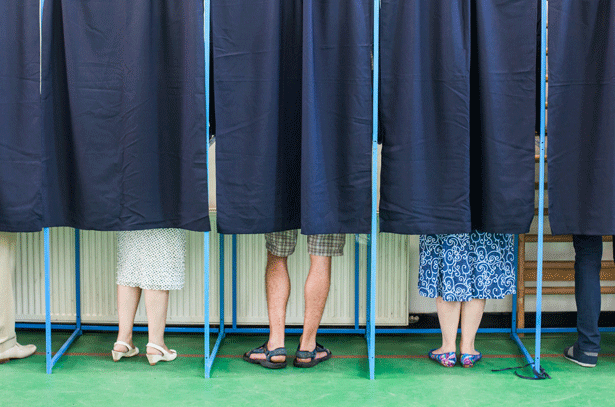
by Lil Tuttle
How many illegal residents and other ineligible voters cast votes in U.S. elections? New studies suggest enough to swing election outcomes, and that’s an unacceptable situation for most U.S. citizens who value their constitutional rights. President Trump has created a new Presidential Commission to do an extensive study, get definitive answers, and present concrete solutions to clean up our inadequate voter registration and balloting systems.
2 Recent Studies, Similar Conclusions
Research published in 2016 in the Electoral Studies Journal by political scientists Jesse T. Richman and Gushan A. Chattha of Old Dominion, and David C. Earnest of George Mason University estimated as many as 2.8 million illegal votes were cast in the 2008 and 2010 elections. Non-citizen participation in U.S. elections, wrote the authors, “has been large enough to change meaningful election outcomes including Electoral Colleges votes, and Congressional elections.”
“The bombshell [in the research] was this,” wrote editors at Investor’s Business Daily:
Noncitizen votes likely gave Senate Democrats the pivotal 60th vote needed to overcome filibusters in order to pass health care reform and other Obama administration priorities in the 111th Congress.
A few Democratic-affiliated researchers disagreed. Researchers Stephen Ansolabehere (Harvard), Samantha Luks (YouGov) and Brian Schaffner (UM-Amherst) dismissed the Richman et. al. study, later writing “the likely percent of non-citizen voters in recent U.S. elections is 0.”
Just Facts, an independent New Jersey research organization, released the results of its study in June 2017. Using extensive data from a Harvard/YouGov study of tens of thousands of voters, Just Facts “estimated that as many as 7.9 million noncitizens were illegally registered to vote in 2008, and 594,000 to 5.7 million voted [in the 2008 U.S. presidential election].”
[Note: After PolitiFact declared the results of his organization’s study “false,” Just Facts’ president James D. Agresti responded with this dissection of PolitiFact’s argument.]
Evidence of Illegal Voting
As political combatants argue whether illegal voting occurs, audits in states and localities are supplying evidence that it does.
- A Public Interest Legal Foundation audit of a sample of Virginia voting records identified 5,500 noncitizens who were registered to vote during this decade, with 1,852 of them casting ballots.
- Another Public Interest Legal Foundation audit of a sample of Philadelphia voting records identified 86 non-citizens registered, with 40 of them casting votes in at least one recent election.
- A North Carolina State Board of Elections audit discovered 508 ineligible voters cast ballots in the 2016 presidential election.
How Do They Get Away with It?
Easily, says the Federation for American Immigration Reform, given the lack of controls on voter registration/voting and the low risk of prosecution if they commit voter fraud. FAIR cites one case in which a Canadian woman registered to vote in New York and voted in 20 elections before federal officials finally prosecuted her.Twelve states and the District of Columbia permit non-citizens residents to obtain drivers licenses, and state DMVs, acting as proxies under the “Motor-Voter Law,” often add these drivers to voter registration rolls with few checks and balances.
In an effort to prevent corrupt voter registration processes, the Real ID Act of 2005 required all states to confirm immigration status when issuing drivers licenses, but only 24 states are in compliance.If legal documentation is a problem, fake papers are cheap. A retired Immigration officer told Bill O’Reilly on air that he routinely encountered illegals with voter registration cards who admitted voting in elections, adding:
Illegals typically buy fraudulent documents in threes: A counterfeit resident alien card or work authorization card, plus a counterfeit California driver’s license, and a counterfeit Social Security card, which costs about $120 to $300.
California Gold
Many states have inadequate systems in place to prevent unlawful voting, argues Judicial Watch.
California is one example. California has the most unauthorized immigrants in the U.S., according to Pew Research, “about 2.3 million in 2014.” As we noted here, California also permits all residents in the state to apply for a driver’s license. And under a 2016 law, those who apply for a driver’s license are automatically added to voter registration lists unless they specifically “opt out.”
As with other states, California does an inadequate job of maintaining its voter registration lists. Linda Paine, president of the Election Integrity Project, told the Washington Times that “8 of 58 California counties now have more than 100% voter-registration rates based on figures posted February 20th by Secretary of State Alex Padilla.”
More than 100%? California’s voter lists combine active and inactive voters, explains Paine, and no ID is required when casting a vote.
It’s critical that every eligible California citizen who wants to vote can easily register. But the state’s woefully inadequate voter list maintenance is creating misleading statistics for our lawmakers and put the votes of lawful voting citizens at risk of voter fraud. …
All one need do [to vote illegally] is look at the posted list, memorize a name and address, repeat it to the poll workers, and receive that person’s ballot, no questions asked.
If an Olympic medal were awarded for best in facilitating unlawful voting, the state would win the gold.
Presidential Commission
On May 11, 2017, President Trump established a Presidential Commission to study the registration and voting processes used in federal elections and to identify the laws, rules, policies, activities, strategies and practices that enhance or undermine the American people’s confidence in the integrity of its electoral process.
For the sake of every U.S. citizen who wants a trustworthy, reliable electoral process, we hope the Commission takes its work seriously and urgently to produce definitive answers and legislative solutions to the questions and problems endemic in our voting process.
